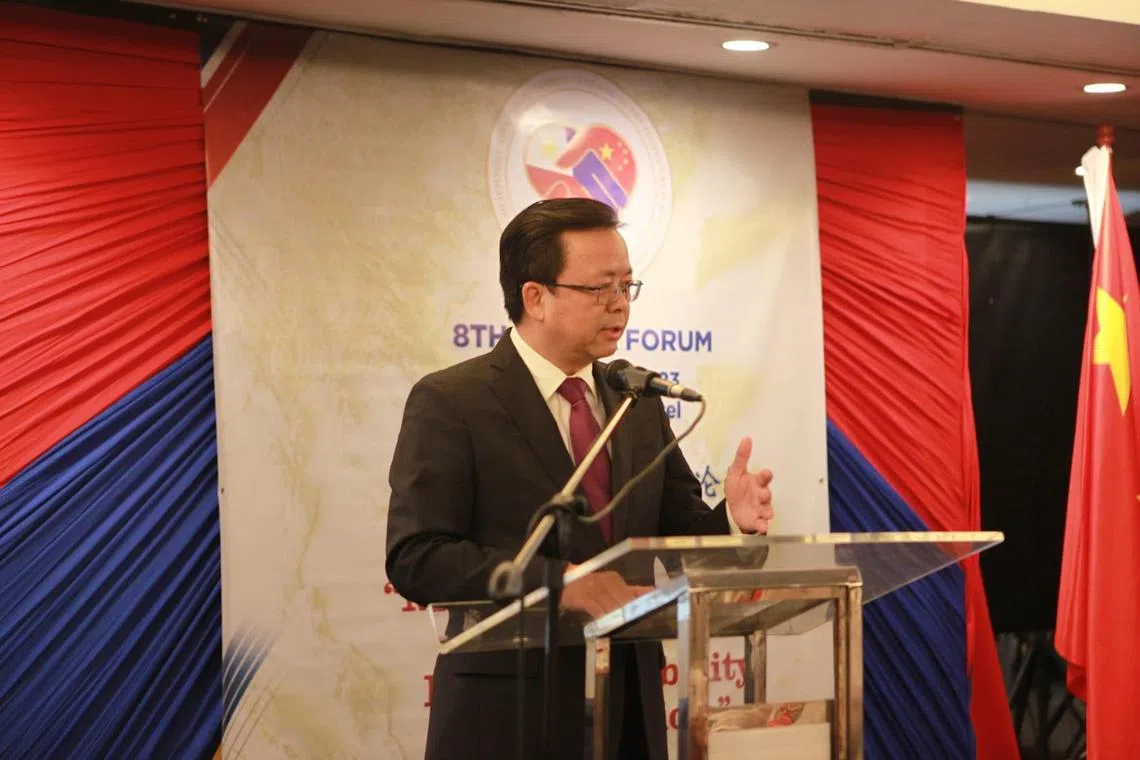Manila says 158,000 Filipinos working in Taiwan are safe amid backlash over Chinese envoy’s remarks
Sign up now: Get ST's newsletters delivered to your inbox

Chinese Ambassador to the Philippines Huang Xilian speaks in a forum on Philippines-China relations held in Manila on April 14.
PHOTO: CHINESE EMBASSY IN THE PHILIPPINES
Follow topic:
MANILA – The Philippines has assured the 158,000 Filipino workers in Taiwan that there are measures to keep them safe, following backlash over the remarks of Chinese Ambassador Huang Xilian
In his speech at a Manila public forum on Philippines-China relations last Friday, he told the Philippines “to unequivocally oppose Taiwan independence rather than stoking the fire by offering the US access to military bases near the Taiwan Strait if you care genuinely about the 150,000 overseas Filipino workers”.
On Monday, the Department of Foreign Affairs said: “We assure the public that contingency plans are in place in all areas where there are a high number of overseas Filipino workers.”
Manila Economic and Cultural Office chairman Silvestre Bello III, the Philippines’ representative in Taiwan, said “there is no cause for alarm” over Mr Huang’s speech.
Manila does not have diplomatic relations with Taiwan because it adheres to a one-China policy.
“I would be the first one to tell you if there is an emergency situation but right now there is no tension. It is very normal in Taiwan now. All our Filipino community members are prepared for any exigency,” he said in a TV interview.
Mr Huang’s speech came as Beijing ramped up its political and military pressure on Taiwan following Taiwanese President Tsai Ing-wen’s meeting with US House Speaker Kevin McCarthy
It was the first time the Chinese envoy commented on the Philippines allowing the US, a treaty ally, to access four more military bases under the Enhanced Defence Cooperation Agreement (EDCA).
Forged in 2014, it allows US forces to build facilities, bring in equipment and hold training drills with their Filipino counterparts at nine military bases in the Philippines. Three of the four new EDCA sites are military facilities in Isabela and Cagayan, two provinces to the north of Manila that are just hundreds of kilometres from Taiwan. The tip of Cagayan is about 580km from Taiwan.
Some Filipino officials hit out at Mr Huang’s comment on the migrant workers but maintained the Philippines’ adherence to the one-China policy.
National Security Council spokesman Jonathan Malaya said Manila will not meddle in the China-Taiwan conflict.
“Our primordial concern in Taiwan is the safety and well-being of the more than 150,000 Filipinos living and working on the island, and we take grave exception to any effort by guests in our country to use this to fear-monger and intimidate us,” he added.
Senator Grace Poe said Mr Huang’s remarks are “uncalled for” while Senator JV Ejercito said it makes it difficult to trust the Chinese government.
Lone opposition senator Risa Hontiveros called for Mr Huang’s expulsion from the Philippines. “These are truly disgraceful statements from Ambassador Huang Xilian. How dare he threatens us... The Office of the President should tell Beijing to recall their representative in Manila as soon as possible.”
Experts said given its geographical location, the Philippines will be caught in a crossfire should tensions escalate in the Taiwan Strait.
Manila-Beijing ties are complicated further by their competing claims over the South China Sea, where Beijing has also been increasing its military activities.
This has pushed Manila to secure deeper security ties with military allies like the US, Japan and Australia.
Despite the tensions, China remains the Philippines’ largest trading partner. Both nations are also exploring a possibility of resuming talks on joint oil and gas exploration in the South China Sea.


